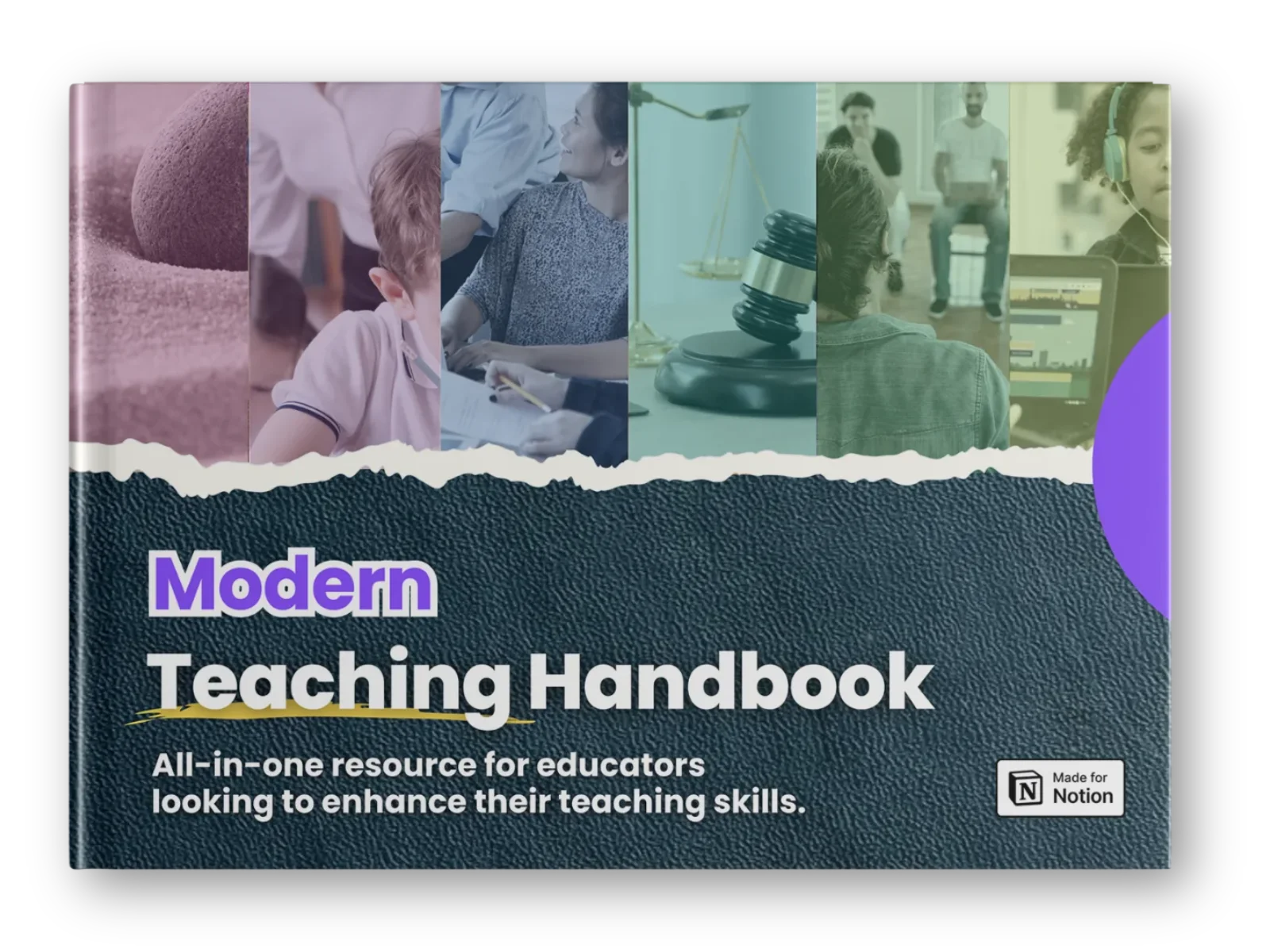Modern Teaching Handbook
Master modern education with the all-in-one resource for educators. Get your free copy now!



How to Overcome Common Challenges Faced by Writers
How to Overcome Common Challenges Faced by Writers
How to Overcome Common Challenges Faced by Writers

Article by
Milo
ESL Content Coordinator & Educator
ESL Content Coordinator & Educator
All Posts
Writing is a real mixed bag. On one hand, it's breathtaking. On the other, it can be a real pain. You'll run into barricades that play with your artistic flow and make it hard to get stuff done. From writer's block to time management matters, these difficulties can be intimidating. But, with the correct strategies, writers can refine their skills. Want to write better? Let's tackle the common problems writers face and find ways to solve them.
Writing is a real mixed bag. On one hand, it's breathtaking. On the other, it can be a real pain. You'll run into barricades that play with your artistic flow and make it hard to get stuff done. From writer's block to time management matters, these difficulties can be intimidating. But, with the correct strategies, writers can refine their skills. Want to write better? Let's tackle the common problems writers face and find ways to solve them.
Modern Teaching Handbook
Master modern education with the all-in-one resource for educators. Get your free copy now!

Modern Teaching Handbook
Master modern education with the all-in-one resource for educators. Get your free copy now!

Modern Teaching Handbook
Master modern education with the all-in-one resource for educators. Get your free copy now!

Addressing Common Writing Challenges
Writers of all levels undergo obstacles that can impede their advancement. Acknowledging these resistances is the first move toward conquering them. Here are some of the most common writing difficulties and tactics to address them. Common writing challenges, such as writer's block, poor structure, or time management issues, can often feel overwhelming. In such cases, seeking assistance from a custom dissertation writing service can provide tailored solutions to overcome these hurdles and keep your writing on track.
Writer's Block
We've all been there. Writer's block hits and you're left stuck, with no ideas. A study by The Creative Penn discovered that 70% of authors face this at some point in their professions. Imagination freeze can come from many places. These include fear of failure, perfectionism, and external stresses. It is a common but knotty issue for many.
Strategies for Overcoming Writer’s Block
Change Your Environment: A new environment can boost creativity. Try writing in a café or park.
Set Small Goals: Split your writing tasks into smaller goals. Instead of writing a whole chapter, aim to complete just one paragraph.
Free Writing: Write freely for a set time. This method helps you bypass self-criticism and sparks new ideas.
Read for Inspiration: Reading other writers' work can spark your creativity. Authors like Stephen King and Anne Lamott stress the value of reading widely to boost writing.
Time Management
Writers often have trouble finding time to write when life gets busy. The truth is, almost half of Americans are too busy for hobbies they enjoy - like writing. This lack of time can cause frustration and guilt. They can worsen writer's block.
Effective Solutions for Writing Difficulties
Prioritize Writing: You've got to write regularly. So, choose a couple of days a week and make them your writing days.
Eliminate Distractions: Eliminate distractions. Make a space that helps you focus. Turn off notifications on your gadgets or try apps like Focus@Will to aid in staying attentive. You'll be amazed at how much more you can get done.
Utilize Time Blocks: Try the Pomodoro Technique. Write for 25 minutes, then take a 5-minute break. This method can boost productivity and prevent burnout.
Lack of Confidence
Many writers face self-doubt. Being nervous about feedback or feeling inadequate can hurt their creativity and productivity. J.K. Rowling, the woman behind the Harry Potter series, got snubbed often before she finally made it big. This illustrates that lack of confidence is common among authors.
Improving Writing Skills and Techniques
Seek Feedback: Sharing your work with trusted peers can give you new ideas. It can also boost your confidence. Supportive criticism can help upgrade your writing and inspire you to use your capabilities.
Celebrate Small Wins: Recognize your progress, no matter how little. Honoring milestones can help create confidence and stimulate you to keep writing.
Practice Regularly: The more you write, the more confident you will become. Write regularly. It will improve your skills and boost your confidence in your voice.
Use AI Wisely: Try AI writing tools like WriteMyEssay AI to brainstorm ideas, create outlines, or generate high-quality papers with proper citations. They can save time and help you focus on refining your arguments and personal insights.
Inconsistent Writing Habits
Inconsistency can lead to frustration and hinder progress. Many writers struggle to write regularly. This causes guilt and feelings of inadequacy.
Navigating Writer's Struggles and Obstacles
Set Realistic Goals: Set realistic writing goals based on your schedule. Be consistent, not perfect. Adjust your goals as needed.
Create a Writing Routine: Form a daily or weekly writing routine that fits your way of life. Consistency helps strengthen writing as a habit.
Join a Writing Group: A group of writers can offer accountability and motivation. Many writers find that sharing their goals with others helps them stay connected.
Perfectionism
Perfectionism can stop writers from finishing their work. The quest for perfect writing often leads to endless edits and delays.
Strategies for Overcoming Perfectionism
Embrace Imperfection: Understand that writing can't be perfect. First, finish your draft. You can improve it later.
Set Time Limits: Allocate a specific amount of time for revisions. It can help you stop overthinking and move forward with your writing.
Shift Your Mindset: Writing is a process. Each draft helps you get better. Mistakes are learning opportunities.
Closing Remarks
Getting past common writing roadblocks is decisive if you want to take your composition to the next degree. Authors can improve their expertise by handling concerns like writer's block, time management, low self-assurance, erratic habits, and perfectionism. Doing so will help them establish better writing tactics. As author Neil Gaiman once said, "The only way to finish a book is to write it." By encircling the writing process and using these approaches, writers can master their adversities. They will then achieve their writing goals. With persistence, anyone can overcome obstacles to their creativity.
Addressing Common Writing Challenges
Writers of all levels undergo obstacles that can impede their advancement. Acknowledging these resistances is the first move toward conquering them. Here are some of the most common writing difficulties and tactics to address them. Common writing challenges, such as writer's block, poor structure, or time management issues, can often feel overwhelming. In such cases, seeking assistance from a custom dissertation writing service can provide tailored solutions to overcome these hurdles and keep your writing on track.
Writer's Block
We've all been there. Writer's block hits and you're left stuck, with no ideas. A study by The Creative Penn discovered that 70% of authors face this at some point in their professions. Imagination freeze can come from many places. These include fear of failure, perfectionism, and external stresses. It is a common but knotty issue for many.
Strategies for Overcoming Writer’s Block
Change Your Environment: A new environment can boost creativity. Try writing in a café or park.
Set Small Goals: Split your writing tasks into smaller goals. Instead of writing a whole chapter, aim to complete just one paragraph.
Free Writing: Write freely for a set time. This method helps you bypass self-criticism and sparks new ideas.
Read for Inspiration: Reading other writers' work can spark your creativity. Authors like Stephen King and Anne Lamott stress the value of reading widely to boost writing.
Time Management
Writers often have trouble finding time to write when life gets busy. The truth is, almost half of Americans are too busy for hobbies they enjoy - like writing. This lack of time can cause frustration and guilt. They can worsen writer's block.
Effective Solutions for Writing Difficulties
Prioritize Writing: You've got to write regularly. So, choose a couple of days a week and make them your writing days.
Eliminate Distractions: Eliminate distractions. Make a space that helps you focus. Turn off notifications on your gadgets or try apps like Focus@Will to aid in staying attentive. You'll be amazed at how much more you can get done.
Utilize Time Blocks: Try the Pomodoro Technique. Write for 25 minutes, then take a 5-minute break. This method can boost productivity and prevent burnout.
Lack of Confidence
Many writers face self-doubt. Being nervous about feedback or feeling inadequate can hurt their creativity and productivity. J.K. Rowling, the woman behind the Harry Potter series, got snubbed often before she finally made it big. This illustrates that lack of confidence is common among authors.
Improving Writing Skills and Techniques
Seek Feedback: Sharing your work with trusted peers can give you new ideas. It can also boost your confidence. Supportive criticism can help upgrade your writing and inspire you to use your capabilities.
Celebrate Small Wins: Recognize your progress, no matter how little. Honoring milestones can help create confidence and stimulate you to keep writing.
Practice Regularly: The more you write, the more confident you will become. Write regularly. It will improve your skills and boost your confidence in your voice.
Use AI Wisely: Try AI writing tools like WriteMyEssay AI to brainstorm ideas, create outlines, or generate high-quality papers with proper citations. They can save time and help you focus on refining your arguments and personal insights.
Inconsistent Writing Habits
Inconsistency can lead to frustration and hinder progress. Many writers struggle to write regularly. This causes guilt and feelings of inadequacy.
Navigating Writer's Struggles and Obstacles
Set Realistic Goals: Set realistic writing goals based on your schedule. Be consistent, not perfect. Adjust your goals as needed.
Create a Writing Routine: Form a daily or weekly writing routine that fits your way of life. Consistency helps strengthen writing as a habit.
Join a Writing Group: A group of writers can offer accountability and motivation. Many writers find that sharing their goals with others helps them stay connected.
Perfectionism
Perfectionism can stop writers from finishing their work. The quest for perfect writing often leads to endless edits and delays.
Strategies for Overcoming Perfectionism
Embrace Imperfection: Understand that writing can't be perfect. First, finish your draft. You can improve it later.
Set Time Limits: Allocate a specific amount of time for revisions. It can help you stop overthinking and move forward with your writing.
Shift Your Mindset: Writing is a process. Each draft helps you get better. Mistakes are learning opportunities.
Closing Remarks
Getting past common writing roadblocks is decisive if you want to take your composition to the next degree. Authors can improve their expertise by handling concerns like writer's block, time management, low self-assurance, erratic habits, and perfectionism. Doing so will help them establish better writing tactics. As author Neil Gaiman once said, "The only way to finish a book is to write it." By encircling the writing process and using these approaches, writers can master their adversities. They will then achieve their writing goals. With persistence, anyone can overcome obstacles to their creativity.
Modern Teaching Handbook
Master modern education with the all-in-one resource for educators. Get your free copy now!

Modern Teaching Handbook
Master modern education with the all-in-one resource for educators. Get your free copy now!

Modern Teaching Handbook
Master modern education with the all-in-one resource for educators. Get your free copy now!

Table of Contents
Modern Teaching Handbook
Master modern education with the all-in-one resource for educators. Get your free copy now!
2025 Notion4Teachers. All Rights Reserved.
2025 Notion4Teachers. All Rights Reserved.
2025 Notion4Teachers. All Rights Reserved.
2025 Notion4Teachers. All Rights Reserved.







